Election 2015: SNP MPs arrive at Westminster
- Published
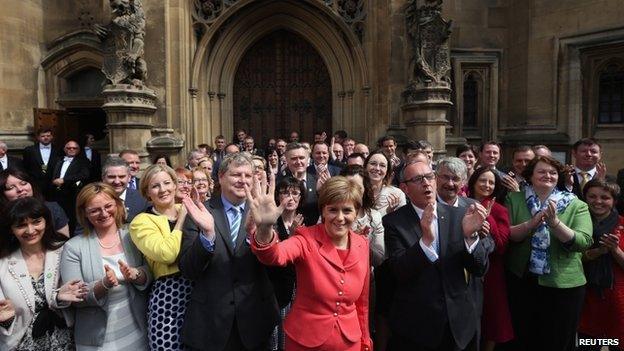
Scotland's 56 SNP MPs gathered at Westminster for their first day at work as part of the new five-year parliament
The SNP's new intake of 56 MPs have arrived at Westminster for the first time since the party's huge success in the general election.
Nicola Sturgeon greeted them outside the House of Commons, where the SNP leader said they would make Scotland's voice heard like never before.
Meanwhile, Prime Minister David Cameron has confirmed David Mundell as the new secretary of state for Scotland.
Mr Mundell is the only Conservative MP in Scotland.
He had previously served in the Scotland Office as a junior minister.
The SNP won all but three of Scotland's 59 seats in last Thursday's election, with Labour and the Liberal Democrats also only holding on to one seat each.
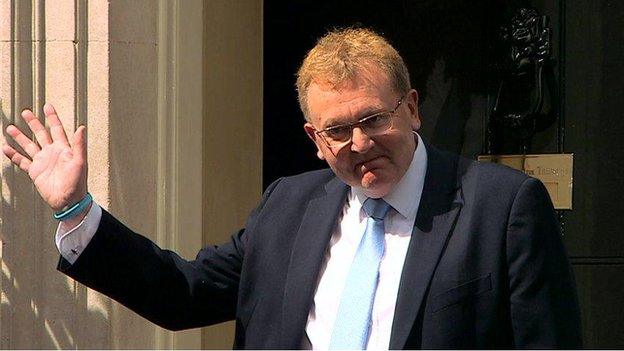
David Mundell has been appointed as the new Scottish secretary in David Cameron's cabinet
Labour confirmed its sole remaining Scottish MP - Ian Murray in Edinburgh South - will be the party's shadow Scottish secretary as the party's MSPs held a near three-hour long meeting held to discuss Scottish Labour's election performance.
The party's leader Jim Murphy has refused to resign but there have been calls for him to go to allow the party to have a fresh start.
Speaking outside the party's HQ after the meeting, finance spokeswoman Jackie Baillie said the "overwhelming majority" of MSPs wanted Mr Murphy and his deputy Kezia Dugdale to "lead us forward into the future".
The SNP is due to formally appoint its Westminster group leader following a meeting of its MPs on Tuesday, with Moray MP Angus Robertson expected to continue in the post he held during the previous parliament.
The role will take on a new prominence with an appearance at Prime Minister's Questions every week after the SNP was officially given third party status in the House of Commons.
As the third largest party in Parliament, the SNP is also expected to take up a front bench on the opposition side of the Commons, which had been occupied by the Liberal Democrats before 2010.
Among the SNP ranks at the Westminster event were former leader and first minister Alex Salmond, and 20-year-old Mhairi Black, the UK's youngest MP in about 350 years.
The group was met by a huge press pack and onlookers wielding a giant Saltire flag.
David Cameron must recognise and respond to the change in Scotland, according to SNP Leader Nicola Sturgeon
Speaking to reporters, Ms Sturgeon said the SNP would be the "principled opposition in this place to the Conservative government."
She added: "The SNP has worked long and hard in this election to make Scotland's voice heard. To have people in Scotland in such overwhelming numbers put their trust in us is fantastic, but also is a big responsibility.
"We are determined to make Scotland's voice heard here in Westminster, but we are also determined to be that voice for progressive politics that we promised to be during the election; to stand up to policies from a Conservative government that will damage Scotland; and to make common cause with others of like mind from across the UK."
Ms Sturgeon, who had a brief telephone conversation with the prime minister last Friday, said she hoped to have "more detailed conversations" with Mr Cameron in the near future.
She said: "His starting point seemed to be to implement the Smith Commission proposals. I don't think that goes far enough and I think that has to be looked at again.
"David Cameron cannot simply operate as if nothing has changed in Scotland - everything has changed."
'Seismic shift'
Mr Salmond, who arrived at the event at the St Stephens' entrance to parliament separately from other SNP MPs, said: "When I was last here we had to run around to look like a crowd - now we are a crowd.
"Obviously we are seeing a major change and shift in Scottish politics. Behind the number of MPs we are seeing a seismic shift - clearly Scotland is on a journey, there's no doubt about that whatsoever.
"But Nicola Sturgeon was quite right - the election result was not a mandate for independence or for a referendum on independence."
Asked how he would adjust from being first minister to a Commons back bencher, Mr Salmond added: "I loved being first minister but everything has its time and I think things are turning out not too badly."
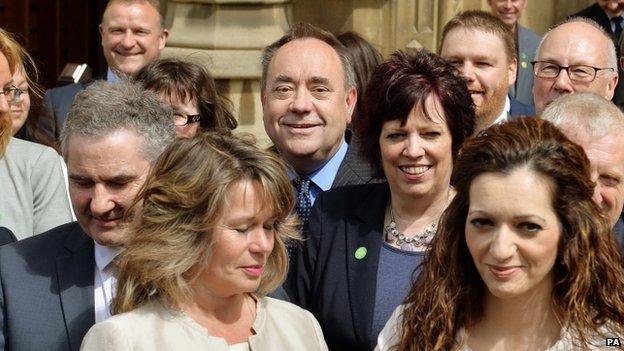
Former first minister Alex Salmond said he would have no difficulty adjusting to life on the back benches
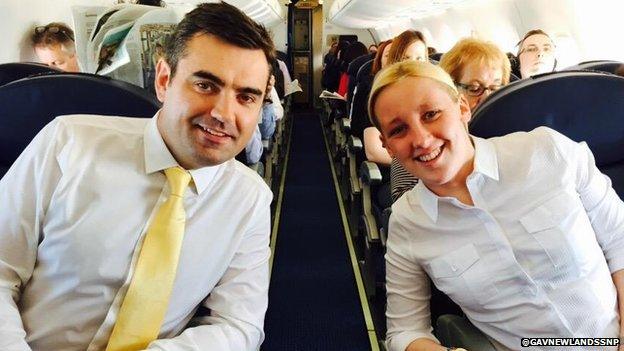
Gavin Newlands and Mhairi Black - who is the UK's youngest MP in 350 years - were among the new batch of SNP MPs who made their way to Westminster
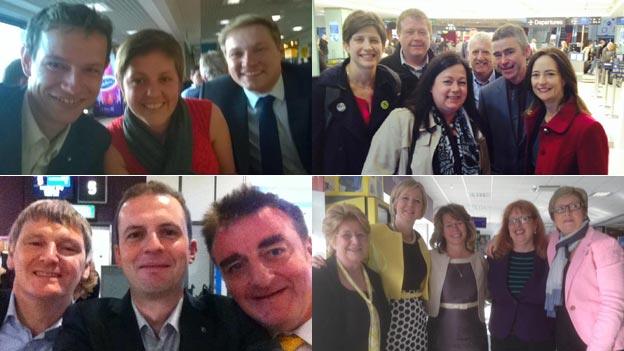
Several colleagues of Mr Newlands and Ms Black were also eager to post selfies as they travelled south
Ms Sturgeon has already issued calls for more powers for Holyrood in the wake of the SNP's election success.
She wants business taxation and control over welfare to be devolved as "priorities", and will meet the prime minister in the coming weeks to discuss the issue.
Some Tory politicians have urged Mr Cameron to offer the SNP full fiscal autonomy.
The policy, which the Institute for Fiscal Studies has said would leave a multibillion-pound shortfall in Scotland's finances, was contained in the SNP's election manifesto.
Lord Forsyth of Drumlean, who served as Scottish secretary in John Major's Conservative government, said a White Paper on full fiscal autonomy was needed.
'Federal solution'
He told the BBC's Today programme: "They got 50% of the vote and 95% of the seats and the reality is you have to respond to that and I think what the government needs to do is produce a White Paper which sets out how fiscal autonomy, devo-max, call it what you will, would work in practice so people are aware of the advantages and the disadvantages.
"The big advantage being Nicola Sturgeon and the SNP would not be able to produce fantasy manifestos that promise the earth without having the responsibility of raising the money to pay for it."
Former Labour chancellor Alistair Darling, who led last year's campaign against independence, told the same programme that he believed the cross-party Smith Commission agreement on more powers for Scotland which was agreed after the referendum had been "completely overtaken by events".
He added: "It won't do the business for Scotland, it's lopsided, therefore it is unfair on England - and if you compound that, as David Cameron has suggested, by saying that essentially English MPs will decide tax and spending, you are well on the way to breaking up the Union."
Mr Darling said the UK instead needed to move towards a federal solution by offering substantially more powers and responsibilities to Scotland, Wales and Northern Ireland.
He added: "Critically they have got to be more responsible for raising the money to pay for things, but at the same time you remove this anomaly where, when I was an MP, I could vote for English education, but I couldn't vote for Scottish education.
"That's got to be dealt with, there's no question about that. But I think if we're intelligent about this we've got a chance for building a constitution for the 21st Century."
2015 election results map
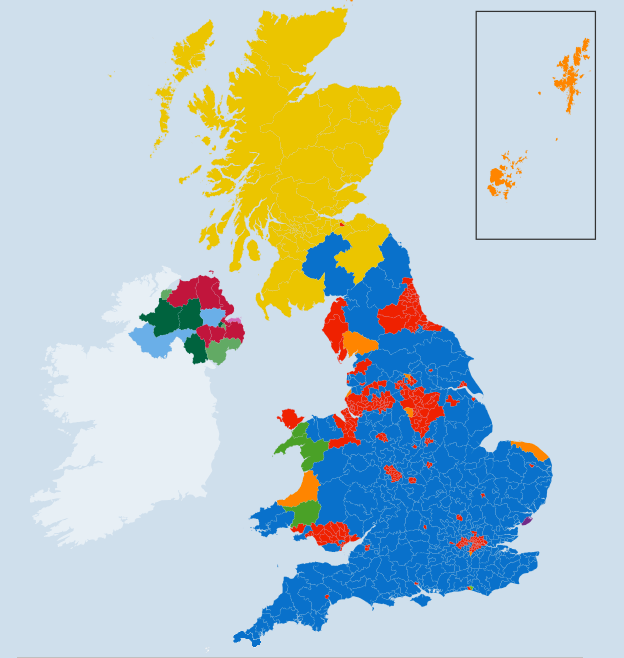
Conservatives won 331 seats and Labour 232 - followed by the SNP with 56 seats out of 59 in Scotland
- Published10 May 2015
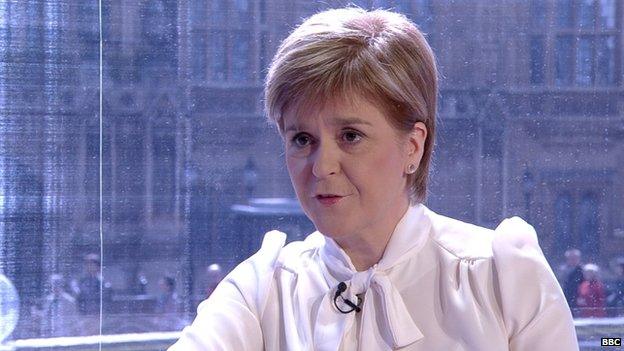
- Published10 May 2015
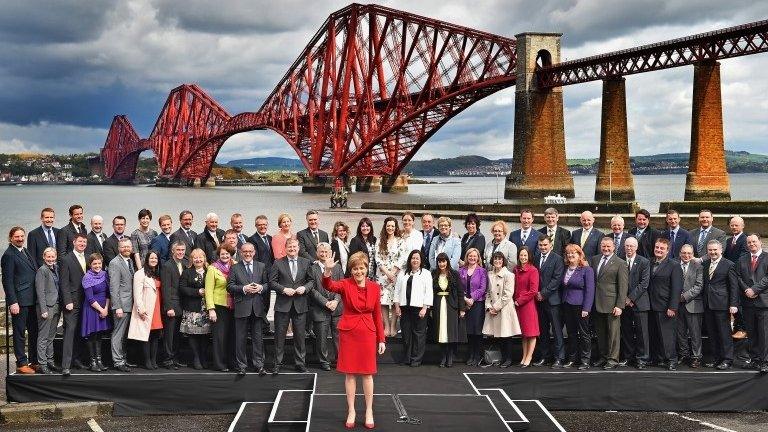
- Published9 May 2015
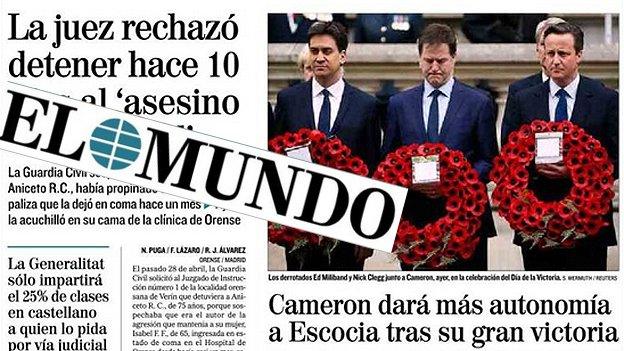
- Published8 May 2015
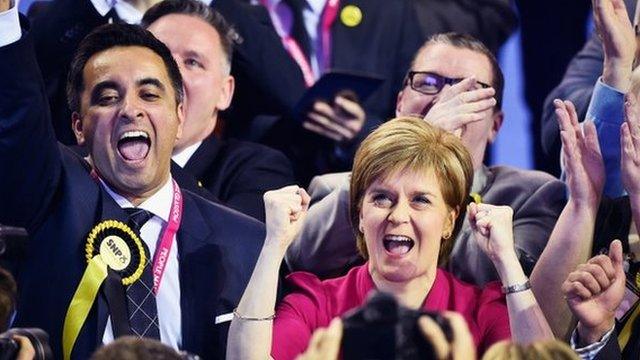
- Published8 May 2015

- Published8 May 2015
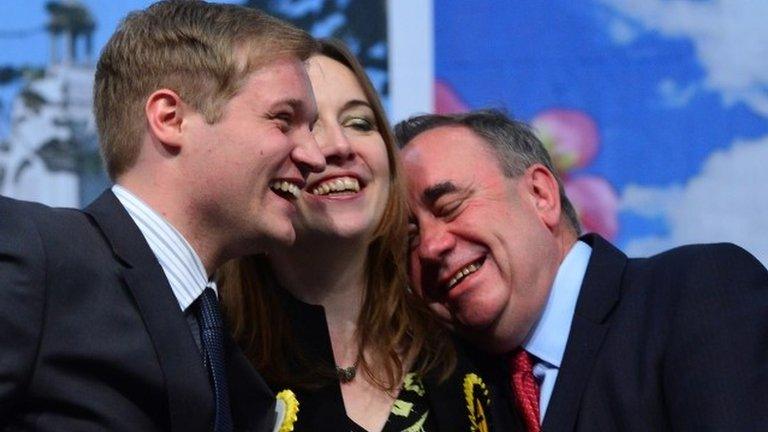
- Published8 May 2015
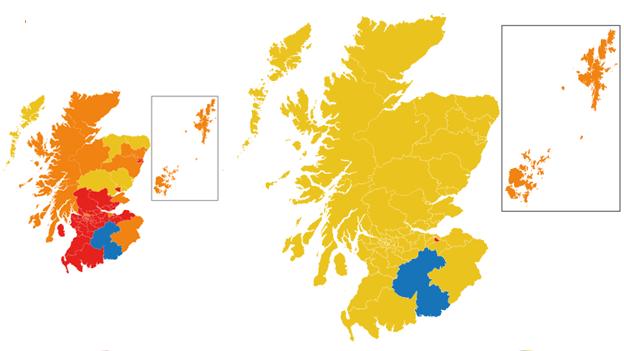
- Published8 May 2015
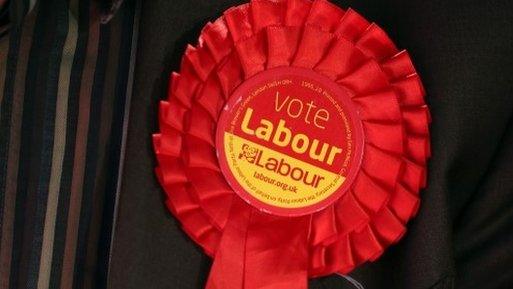
- Published8 May 2015
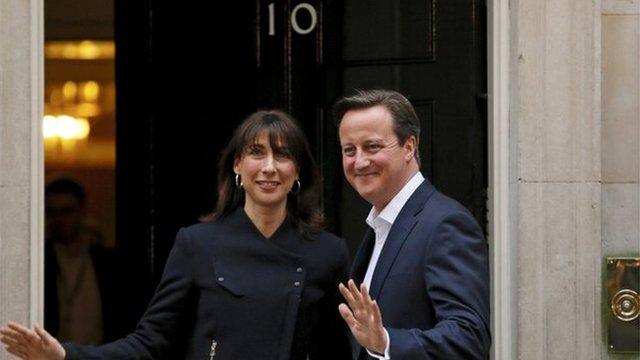
- Published8 May 2015
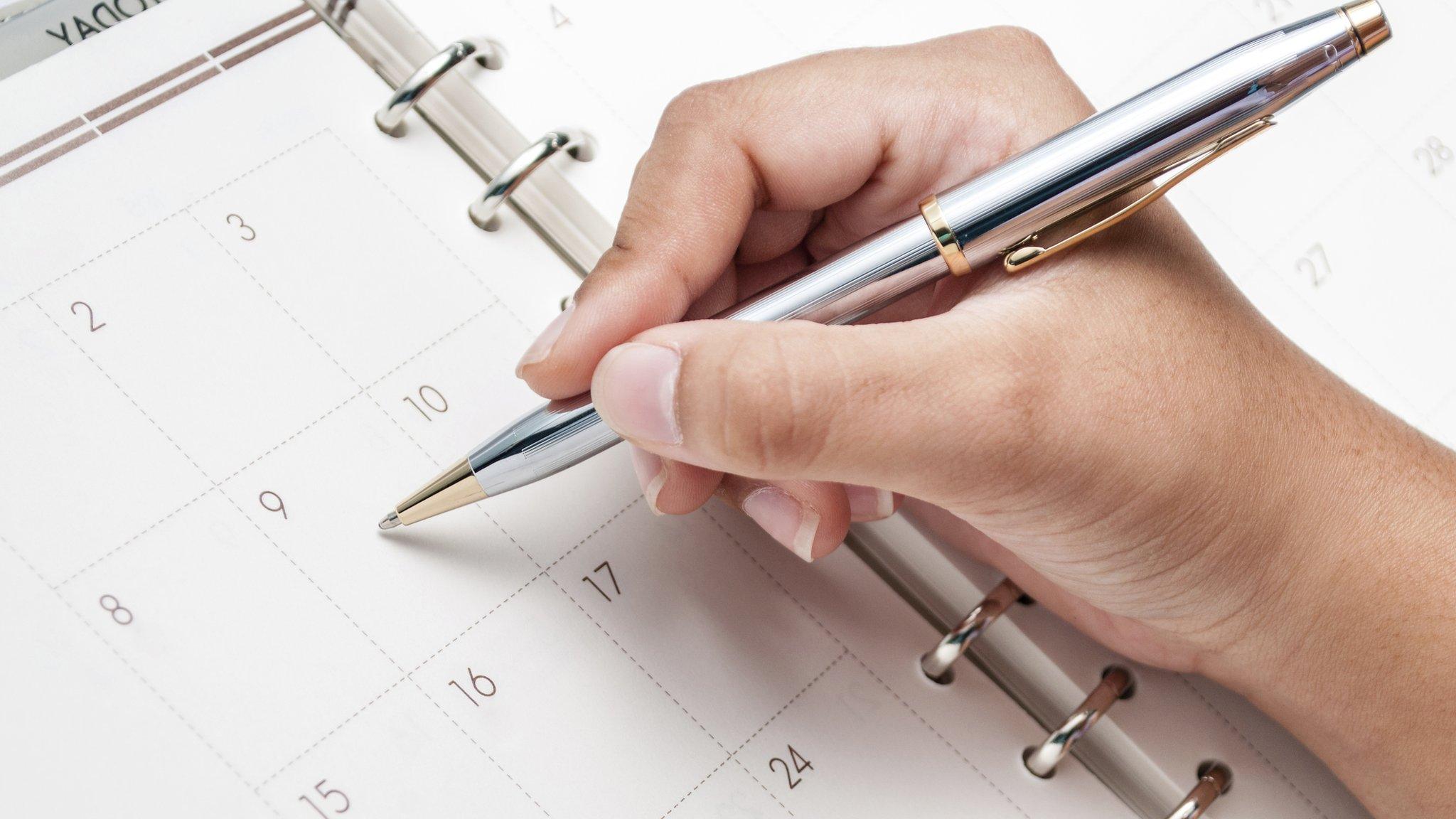
- Published8 May 2015
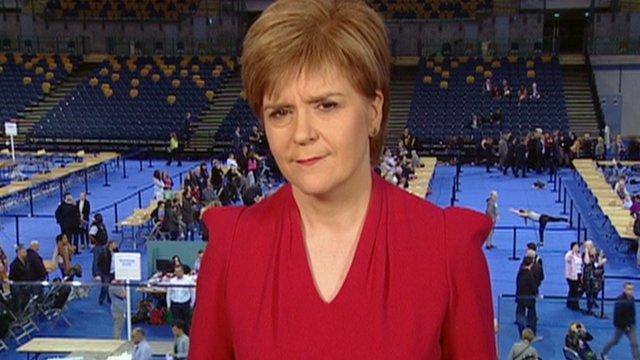
- Published8 May 2015